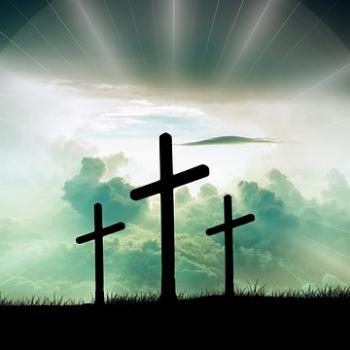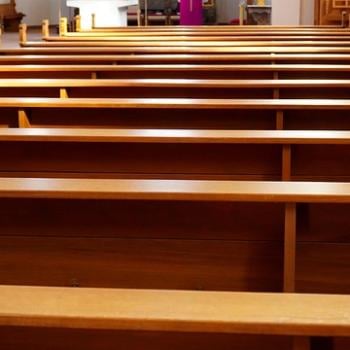LISA ASKS:
What do Christians say happened during [Jesus’] “descent into hell,” and do most denominations believe this happened?
THE RELIGION GUY ANSWERS:
This week, as every week, uncountable millions of Christians attending church will profess that Jesus Christ “was crucified, died, and was buried. He descended into hell. On the third day he rose again from the dead…” So states the venerable Apostles’ Creed, which includes a cryptic “descent” phrase about the period between Good Friday and Easter. Some modern rituals say Jesus “descended to the dead” instead of “hell.”
Unlike the Apostles’ Creed, the Nicene Creed moves directly from Jesus’ crucifixion and burial to his resurrection with no mention of a descent. Lisa’s full question pointed out this key difference between the two ancient creeds that have long dominated Christian worship services and catechisms.
The Apostles’ Creed is part of Catholicism’s baptism ritual and widely recited by Protestants. Though Eastern Orthodoxy uses only the Nicene Creed in worship it has affirmed Jesus’ descent since ancient times. The Apostles’ Creed developed from the Old Roman Creed of the late 2nd Century, which originally did not mention a descent. The earliest surviving texts with that phrase come from the Christian East in A.D. 359 and the Latin West in 404.
Analysts have said the descent is the creed’s “most controversial” tenet, and that no other phrase in it “has caused so much difficulty” or provoked such “long-standing, lively, and ultimately inconclusive discussion.” Christians agree that both creeds teach the reality of Jesus’ death but there’s debate on whether descent means something more and should be taken literally. Various biblical passages play into the discussion, especially 1 Peter 3:18-19, a difficult text that says Jesus was dead “in the flesh but made alive in the spirit, in which he went and preached to the spirits in prison.”
In Catholic tradition, St. Augustine thought the 1 Peter statement is allegorical, whereas the later theologian St. Thomas Aquinas said Jesus actually descended, both to the sinners temporarily punished in purgatory and to the permanently damned who inhabited hell. Medieval art and drama offered imaginative depictions of Jesus’ “harrowing of hell,” often drawing upon the apocryphal Gospel of Nicodemus.
The contemporary Catholic catechism states that the creed’s “first meaning” is that “Jesus, like all men, experienced death and in his soul joined the others in the realm of the dead,” but that he also descended “to free the just who had gone before him.” It cites 1 Peter 4:6: “The gospel was preached even to the dead, that though judged in the flesh like men they might live in the spirit like God.”
Keith L. Johnson, a Protestant theologian at Wheaton College (Illinois), explained three current understandings of the descent in an article this year:
1) A traditional view with 2nd Century origins says Christ descended as the triumphant king to preach to the righteous dead from Old Testament times about his saving victory for them over sin, death, and the devil.
2) Presbyterian and Reformed Protestants, among others, agree with Augustine that the descent was not literal. Rather, it expresses the depth of Jesus’ hellish sufferings and triumph through the reality of death. The Westminster Larger Catechism states that Jesus continued “in the state of the dead and under the power of death till the third day.”
3) Modern Catholic theologian Hans Urs von Balthasar saw a literal descent in which Jesus endured spiritual death in hell as well as during his crucifixion.
Johnson’s summation: Option #1 “sees the descent in light of the resurrection,” #2 “interprets it as a gloss on the crucifixion,” and #3 “sees it as the extension and perfection of the crucifixion.”
Eastern Orthodox interpretations beginning in the 2nd and 3rd Centuries were analyzed in a 2002 U.S. lecture by visiting Russian theologian and Bishop (now Metropolitan) Hilarion Alfeyev. He said many Church Fathers of the East thought Jesus preached in hell to provide the opportunity of salvation to all those who did not or could not know of him during their earthly lifetimes. Orthodox thinkers have also proposed that this was true not only for souls in the 1st Century but for all of future history. In this optimistic scenario, there’s a second chance in the afterlife.












